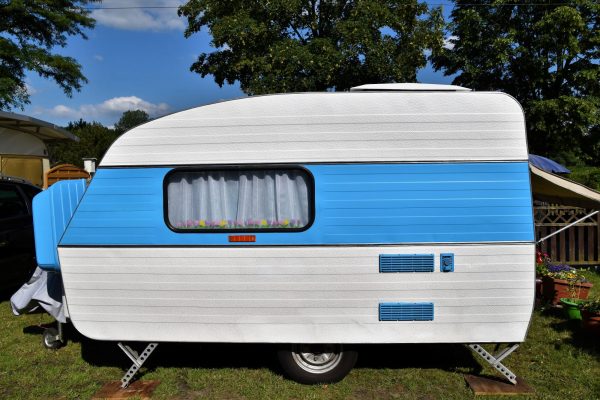Is buying a caravan cover a good idea?

When it comes to storing a caravan for the winter, caravan owners often have different opinions on whether to use a caravan cover.
Although some believe that caravans don’t need to be covered, others firmly believe covering your caravan is the only way to protect it from harsh weather, bird droppings and general wear and tear.
But if you have nowhere to keep your caravan during the harsh weather, you need to pick one that fits well. Choosing a badly fitting one made from poor quality materials may scratch the paintwork and encourage a build up of condensation both inside and outside the van, leading to mould and mildew problems. Adrian Flux takes a look at a selection of options available on the market at the moment, as well as the pros and cons of using a caravan cover.
The pros of using a caravan cover
Picture of a ProTec Cover in use.
Protection from rain, dirt, tree sap and animal droppings
The main purpose of any vehicle cover is to protect it from damage caused by the harsh elements, as well as any annoying animal droppings. Like with cars, bird droppings can damage the paintwork on your caravan in the same way as other unwanted scuffs if left to sink into the paint for a prolonged period. Other natural elements, such as desert rain and tree sap, can also eat away at your caravan’s paintwork.
Using a cover can also prevent damp setting into the caravan and stop water from rotting both the interior and exterior.
Protection from UV fading
UV rays can fade paintwork on your caravan during intense bursts of sunshine, both at home and abroad on your travels. It can also damage the seals on the doors and windows, or cause the paintwork to flake or crack if exposed to severe heat, so using a caravan cover can prevent these harmful rays from damaging the exterior bodywork.
Provides extra security
One overlooked benefit is using a caravan cover can potentially prevent thieves from trying to steal your caravan or your goods inside. This is because using a caravan cover means that potential thieves can’t easily identify what caravan model you have, nor can they see what you have stored within the caravan.
The cons of using a caravan cover

Covers can cause damage when putting them on and removing them
An average caravan stands at around eight feet tall, much taller than the average human. So trying to put a caravan cover on can be a tricky feat without the correct equipment. It really is at least a two person job.
Even with the correct equipment, it is still very easy to damage your caravan while putting the cover on and taking it off. For example, you may pull away exterior items such as solar panels, the TV aerial, or you may scratch the paintwork.
Chipping or scratching the paintwork
Ironically, despite caravan covers being made to protect your pride and joy from scratches and scuffs, should you buy a cheap cover, this may end up doing more harm than good. Chips or scratches typically happen when the cover flaps in heavy winds.
You might think getting a more expensive and high-quality caravan cover will do the job. Unfortunately, even the most premium covers can cause scratches if you’re not careful. Before fitting any caravan cover, it is vital you wash the outside completely and remove any grit that could be trapped between the caravan and the cover. Leaving grit or grime could have a wearing effect on the caravan finish if the caravan moves in the wind.
Your caravan and the cover could become mouldy
Just as the cover can cause scratches, it can also cause the caravan to incur mould and mildew problems. This can happen for a variety of reasons, such as:
the caravan being moist and not cleaned before putting the cover on
the cover not using breathable material to allow the moisture or condensation to escape
the cover not being water resistant
How much does a caravan cover cost?

The cost of a caravan cover can vary from £70 to over £300. The more expensive covers tend to be ones that are custom fitted to your van. Although they are more expensive, these are generally easier to fit and have higher quality material.
If you were to opt for a cover, we would always recommend the tailormade and bespoke cover as the material used allows for a greater degree of breathability, durability and water resistance.
What are the best caravan covers to buy?
There are a number of options available depending on your needs.
Pro-Tec Covers fit snugly around the caravan and are designed with a zipped opening that corresponds to the caravan door, making them ideal for quick and easy access. Webbed straps are supplied to go under the caravan to firmly secure the breathable cover. These covers, designed for strength and durability, can be left on the van for the whole of the winter period.
The lightweight, low-cost, aluminised water-resistant fabric covers from Towsure have nylon straps, side zippers and elasticated hems for a tight fit.
For a cheap and easy alternative to covers, try one of the specialist fluids on the market. These are formulated to be sprayed onto caravans, effectively making a protective jacket for the winter months. Fenwick’s Overwintering doesn’t crack in the frost or snow and is rain and wind proof. It can be washed off in the spring with a cleaning fluid prior to putting the van back on the road.
Where can I get quality caravan insurance?
Whether you decide to buy a caravan cover or not, it is best practice to insure your pride and joy. The cost of repairing or replacing your caravan can be a huge outlay compared to the initial cost of getting it insured in the first place. Read our blog “Do I need insurance when towing another vehicle?” to find out more.
For a cheap, no-nonsense caravan insurance quote, call the experts at Adrian Flux on 0800 369 8590 or request a callback at a time that suits you. Policies start from just £70 a year.






